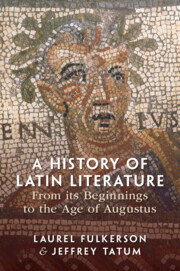Book contents
- A History of Latin Literature from its Beginnings to the Age of Augustus
- A History of Latin Literature from its Beginnings to the Age of Augustus
- Copyright page
- Contents
- Maps
- Acknowledgements
- Chronology
- Abbreviations
- Sidebars
- Maps
- Introduction
- Chapter 1 Romanised Muses: The Birth of Latin Literature
- Chapter 2 All the World’s a Stage: Roman Republican Drama and Theatrical Traditions
- Chapter 3 A Good Man Skilled in Speaking: Oratory and Rhetoric in Rome
- Chapter 4 Song of Myself: The Personal Voice in Republican Literature
- Chapter 5 To Educate and to Entertain: Didactic and the Arrangement of Knowledge
- Chapter 6 What’s Past Is Prologue: History and Biography
- Chapter 7 Moments of Glad Grace: Augustan Love Poetry
- Chapter 8 Gods, Monsters, and Heroes: Augustan Epic
- Chapter 9 Further Voices: Augustan Personal Poetry
- Coda
- Glossary of Names and Terms
- Index Locorum
- Index Nominum
- General Index
Introduction
Published online by Cambridge University Press: 14 November 2024
- A History of Latin Literature from its Beginnings to the Age of Augustus
- A History of Latin Literature from its Beginnings to the Age of Augustus
- Copyright page
- Contents
- Maps
- Acknowledgements
- Chronology
- Abbreviations
- Sidebars
- Maps
- Introduction
- Chapter 1 Romanised Muses: The Birth of Latin Literature
- Chapter 2 All the World’s a Stage: Roman Republican Drama and Theatrical Traditions
- Chapter 3 A Good Man Skilled in Speaking: Oratory and Rhetoric in Rome
- Chapter 4 Song of Myself: The Personal Voice in Republican Literature
- Chapter 5 To Educate and to Entertain: Didactic and the Arrangement of Knowledge
- Chapter 6 What’s Past Is Prologue: History and Biography
- Chapter 7 Moments of Glad Grace: Augustan Love Poetry
- Chapter 8 Gods, Monsters, and Heroes: Augustan Epic
- Chapter 9 Further Voices: Augustan Personal Poetry
- Coda
- Glossary of Names and Terms
- Index Locorum
- Index Nominum
- General Index
Summary
In this Introduction the point is underlined that no prior familiarity with Greek or Latin literature is taken for granted, nor are readers expected to know these languages: everything is translated. In this volume, literary interpretations are suggestive, not prescriptive. There is a brief discussion of the hazards of periodisation in any history of literature and a warning against accepting too readily the teleological view of Latin literature which one finds in ancient sources and, sometimes, in modern accounts. The difficulties inherent in dealing with texts that survive only as fragments – an unavoidable necessity when discussing republican literature – are discussed; fragments are preserved for a range of reasons: sometimes owing to a linguistic oddity, sometimes to a later writer’s literary or political agenda. Consequently, conclusions about fragmentary texts can only be provisional. This Introduction also furnishes guidance on various features of this volume.
- Type
- Chapter
- Information
- Publisher: Cambridge University PressPrint publication year: 2024

